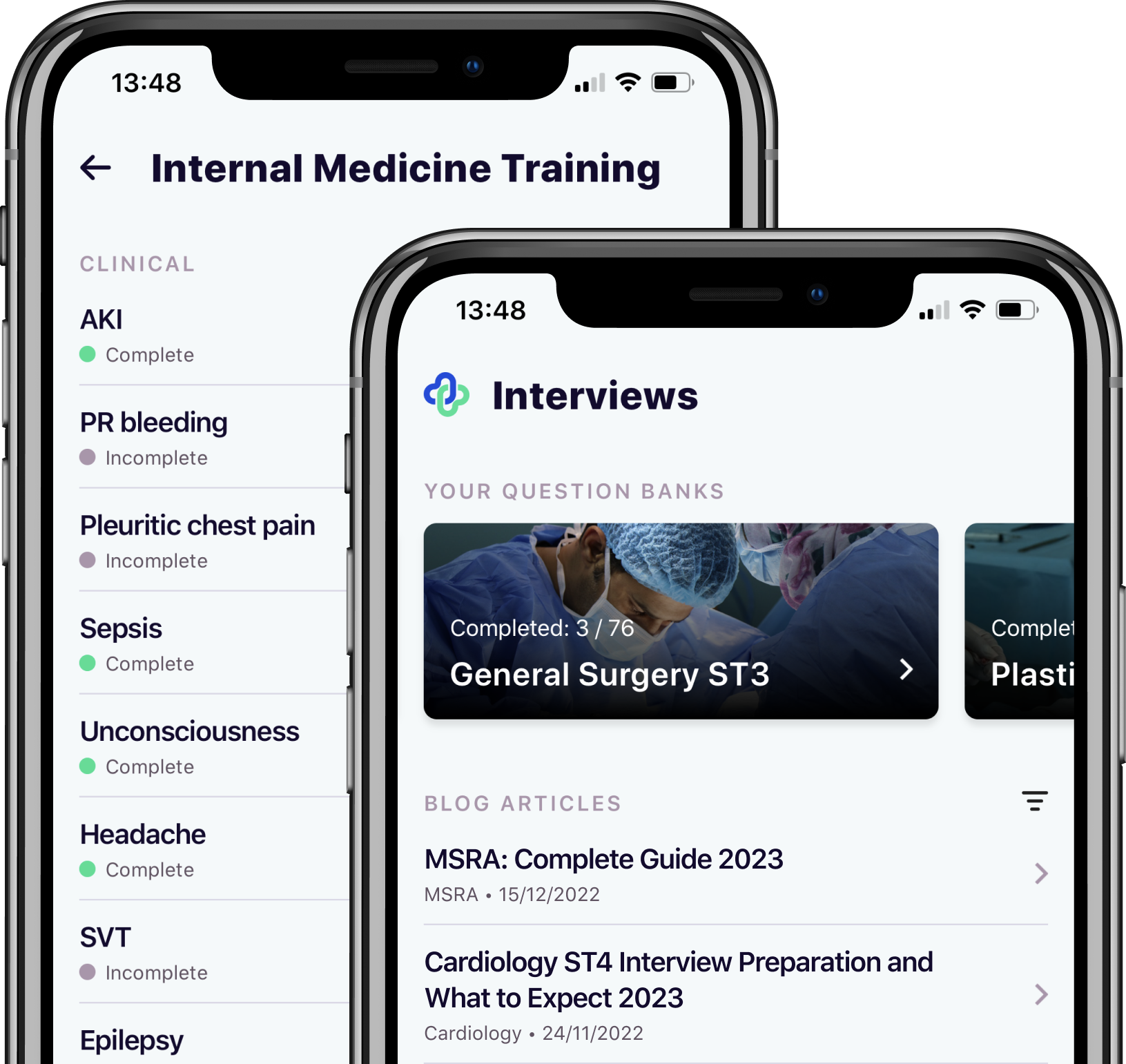
A guide to the 2026 Internal Medicine Training (IMT) Applications
Internal Medicine Training (IMT) applications are fast approaching!
As we’re sure you already know, IMT is a competitive specialty. In 2025, 8841 people applied for the 1678 vacancies; making a competition ratio of 5.27. This is yet another increase on the previous years, with the number of applicants and competition ratio continuing to grow year-on-year. So, you don’t want to waste any time, start thinking about what job you want and where you want it.
IMT applications are run through Oriel, and it is worth setting up an account before it opens so you receive updates and don’t miss the date. The application period lasts for around a month, but it’s best to start your application early as it can take some time to complete the whole thing.
We recommend familiarising yourself with the timetable for internal medicine training recruitment:
| Timeline for 2026 IMT recruitment round 1 | |
|---|---|
| Vacancies published | By 5pm Wednesday 22 October 2025 |
| Applications open | At 10am Thursday 23 October 2025 |
| Applications close | At 4pm Thursday 20 November 2025 |
| Initial shortlisting confirmed | By Wednesday 26 November |
| Longlisting confirmed | By Tuesday 16 December 2025 |
| Shortlisting confirmed | By Wednesday 17 December 2025 |
| Invitation to interview by | Thursday 18 December 2025 |
| Interview booking deadline | Monday 22 December 2025 (first invites) Monday 29 December 2025 (second invites) |
| Interviews held | Monday 12 January to Friday 13 February 2026 |
| Rankings released | Tuesday 24 February 2026 |
| Programme preferences | Tuesday 24 February to Monday 16 March 2026 |
| Offers made | By Tuesday 24 March 2026 |
| Hold deadline | At 1pm on Thursday 2 April 2026 |
| Upgrade deadline | At 4pm on Wednesday 8 April 2026 |
| Scoresheet feedback released | Thursday 2 April 2026 |
| Advertised post start date | Wednesday 5 August 2026 |
Further information on these dates can be found here on the IMT recruitment page.
The IMT application is divided into several sections, but these can basically be split into the eligibility section and the evidence section (this is where you score your points).
What is the eligibility section of your IMT application?
This is essentially your right to work in a training program in the UK. If you are applying from overseas, you will need evidence of your visa status.
In this section, you will have to show that you have completed FY2 or are currently training as an FY2. Again, if you are applying from overseas, you will need to show your equivalent training completion.
You will need details of your Degree and your GMC registration – these should then be stored in your IMT eligibility folder.
Finally, you will need to provide a list of each place you have worked and the level of each rotation. This is the time laborious bit! Once this is all entered, you will then need to provide three referees. These referees are simply to confirm that you are a doctor who has no training concerns. One must be your current educational supervisor or equivalent, and the other two you can choose.
All of this information can take time to put together, so get it sorted now and you’ll breeze through the application process, giving you more time to prepare for the actual interview. We’ve designed the Internal Medicine Training Interview Question Bank to help you with that.
How important is the evidence section of your IMT application?
This is the bit of your IMT application that counts, and where the score for your shortlisting comes from. You should have evidence for everything that you include in your IMT application. That’s easy when it comes to a paper you have written or a poster you have presented, but it can get harder when you are asked to show evidence for teaching that you have done or a leadership course you have attended. Certificates are obviously a good source of evidence, so make sure you collect them after each course and keep them safe. Letters, written and signed by a consultant, are also a good form of evidence, particularly for those harder to prove things – for example, setting up a ward-based teaching program or leadership experience. The main thing is that you think about these things early and get them in place.
How is my IMT application score decided?
- Postgraduate: You either score here or you don’t (don’t worry if you don’t – it’s definitely not essential and you’ll claw back the marks later on). MRCP(UK) does not count in this section. Make sure you have your degree certificate in your portfolio!
- Presentations/Posters: Talk to your supervisor and find out what projects they have on the horizon; can you help with an abstract submission for an upcoming conference, for example? You can score points here if you’re the first or second author on a poster, even if you’re not the one to present it! Remember, there’s a separate section for Quality Improvement, so you can’t include posters you have presented for QI projects here.
- Publications: You’ll score the most points in this section if you’re the first author on one or more PubMed cited papers. However, you can pick up points for any publication you’ve been involved in, so it’s always worth including them. If you’re lacking in this area, ask your consultant about writing a case report or see if you can write a piece for a journal, as even conference reviews will score you some points! Remember, you must be prepared to talk about any publications you include during your interview.
- Teaching Experience: The points here are gained for showing that you can develop and deliver your own teaching program; this can be as simple as starting a ward-based teaching program for the whole MDT. Start the sessions, collect your feedback (put it in the appendix of your portfolio) and ensure you get a letter from your supervisor or consultant saying what you’ve done to score well. Teaching medical students is good, but be the one to create the program, and you’ll score the best!
- Training in Teaching: A higher qualification in teaching, such as a PG Cert or PG Diploma, will score you the maximum points available. However, you can still boost your application by completing at least six hours (e.g. a one-day course) of synchronous (live) teaching, which should earn you an additional 1 point towards your application score and may also be discussed at interview. Medibuddy’s Live Teach the Teacher course is designed with this in mind, offering both 1-day and 2-day options that provide the required synchronous teaching hours while equipping you with practical teaching skills you can use throughout your career.
- Quality Improvement: This section used to be called ‘Audits’, but now it’s QI, and getting full marks should be straightforward. You can design a QI project tomorrow – follow the PDSA Methodology and capture two cycles, present it and you’re done. No excuse for not hitting the 10 points on offer! (Remember: Unfortunately, you cannot claim a presentation of your quality improvement project in the presentation section of the application form; presentations relating to audits or quality improvement projects must be detailed here as the scoring system is set up to include this.)
These 6 topics are what will ultimately make up your IMT application score. Start thinking about them now and where you can pick up easy points. You can learn more in our guide to maximise points in the 2026 Internal Medicine Training (IMT) Application.
Achievements must have been completed before they can be claimed, so ensure you have your documentary evidence available when you apply.
There are sections to include any relevant training courses you have attended and MRCP examinations you’ve successfully completed. Note that this is not an essential requirement for IMT; however, completing MRCP Part 1 is desirable.
Commitment to Specialty
Applicants who only apply to the joint IMT/ACCS-Internal Medicine (ACCS-IM) process will be awarded 5 points in shortlisting. These points are designed to recognise applicants’ commitment to internal medicine in response to increasing competition for training places.
There is also a section at the end of the IMT application form where applicants are encouraged to write a few words discussing their commitment to medicine. This comprises of two questions: the first asks you to describe why you have applied; the second focuses on what you’ve done to prepare. Each question has a limited word count of only 150.
In previous years, this was only rarely reviewed, and generally discussed as a question in the portfolio stage of the interview. However, since the cancellation of the portfolio station, more emphasis has been placed on this. If you’re invited to interview, you can expect a significant focus on commitment to specialty, and your answers in this section will likely be discussed.
Therefore, TAKE IT SERIOUSLY! Take time to think and write about why you want to apply for internal medicine, what you enjoy, what you want to get out of it, and most importantly, what you can offer to your consultant colleagues that would make them want to choose you (this is ultimately what it’s all about!).
Good luck with your Internal Medicine Training application!
Further reading:
Internal Medicine Training (IMT) Interview Question Bank
How to maximise points in the Internal Medicine Training (IMT) Application
Internal Medicine Training (IMT) Portfolio Guide
Internal Medicine Training (IMT) Interview Tips
Check out all our Internal Medicine Training (IMT) Interview Resources.

Take your subscriptions with you
Our mobile app allows you to access your interview and exam question banks wherever you are.





